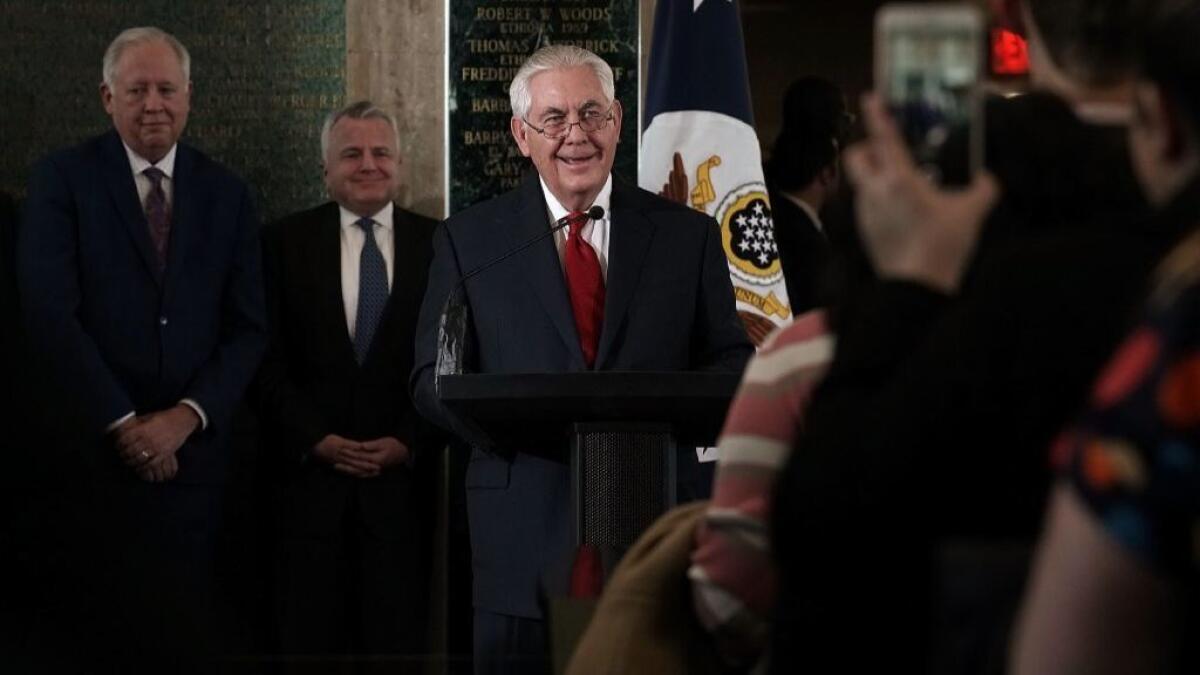Trump receives new foreign ambassadors, but he’s yet to name U.S. envoys to major postings

- Share via
Reporting from WASHINGTON — President Trump officially received four foreign ambassadors into the United States on Monday, a White House ceremony that also was a reminder that he has yet to send many U.S. ambassadors abroad — to dozens of key diplomatic posts.
Fourteen months into his administration, for example, the United States has no ambassador to South Korea as Trump prepares for a high-stakes meeting with North Korean leader Kim Jong Un.
Nor has the president even nominated ambassadors to several important allied nations in the Middle East, where tensions have recently flared, including Saudi Arabia and Qatar. The same goes for Jordan and Egypt, the only two Arab states that recognize Israel and which are vitally important to dealings with the Palestinians.
Also empty is the ambassadorship of Turkey, a NATO ally, where President Recep Tayyip Erdogan nonetheless has become increasingly anti-American and is reaching out to Russia, as well as the job of envoy to the European Union.
Of a total of 188 foreign posts, 56 are vacant in 46 countries and 10 international organizations normally headed by an ambassador, according to the American Foreign Service Assn., the organization that represents diplomats.
Of the 56 open positions, 17 have nominees awaiting Senate confirmation. That leaves the bulk of the traditionally much-desired jobs just waiting for Trump to make a decision.
The vacancy rate is roughly twice that under then-President Obama at this point in his term, according to the association.
Some in the White House and elsewhere blame outgoing Secretary of State Rex Tillerson and his cost-cutting campaign for the dearth of diplomats. Tillerson’s defenders say he was merely following the tone and directives set by the White House, which demanded that the State Department budget be cut by a third.
In the end, many lawmakers saw the proposed reduction as too draconian and Congress actually approved a small increase in the department’s budget. Trump fired Tillerson on March 13.
Whatever the cause of the vacant ambassadorial residences, veteran diplomats say the voids cripple U.S. influence abroad at a time of heightened dangers in many parts of the world.
“There is simply no denying the warning signs that point to mounting threats to our institution — and to the global leadership that depends on us,” Barbara Stephenson, former ambassador to Panama and president of the foreign service association, said on the group’s website.
She said the State Department’s diplomatic ranks had been “depleted at a dizzying speed.”
Not only is Trump failing to fill vacancies, but also his administration has forced some ambassadors out and spurred others to leave by choice.
Stephenson’s earlier post in Panama is vacant now because the most recent occupant, John Feeley, abruptly quit this month, saying he could no longer represent the administration. Trump had “warped and betrayed” the United States’ “traditional core values,” Feeley said at the time.
The “current administration has little respect for those who have served the nation apolitically for decades,” he wrote in an op-ed piece published by the Washington Post on March 9.
The ambassador in Mexico, Roberta Jacobson, is also stepping down, effective May 5. No replacement has been nominated.
Filling the South Korea post in Seoul has been especially fraught. The Trump administration nominated academic Victor Cha, a preeminent expert on the region, and then dropped him after he criticized a proposal that Trump was floating to conduct a preemptive “bloody nose” military strike on North Korea.
There are other voids in the region. Around the time that Cha’s nomination collapsed came the abrupt resignation of the special envoy for the Korean peninsula, Joseph Yun, who was in charge of dealings with the North Korean government in Pyongyang. The candidate for assistant secretary of State for East Asia, Susan Thornton, has still not been confirmed. She was famously criticized, by name, by former White House advisor Stephen K. Bannon, who said he planned to get rid of her.
State Department officials reject the idea that American foreign policy is suffering because of empty ambassadorships and losses like Yun.
“The State Department has 75,000 people that work for us around the world,” spokeswoman Heather Nauert said. “To imply that Ambassador Yun is the only one who’s capable of handling North Korea would simply be wrong. We have a deep bench of very experienced people.”
Overall, the number of foreign service officers dropped nearly 3% in 2017 between March and the end of December, to 7,940, the State Department says. However, new applicants to join the service have fallen by half.
Ambassadors are generally a mix of experienced career diplomats and political appointees rewarded for their political or financial support. Callista Gingrich, the wife of former House Speaker Newt Gingrich, one of Trump’s fervent supporters, was named ambassador to the Holy See in Vatican City, for example, while Jamie McCourt, the former owner of the Los Angeles Dodgers baseball team who donated more than $400,000 to the Trump Victory Fund, was tapped for France, one of the most coveted ambassadorships.
The foreign ambassadors who presented their credentials formally to Trump at the White House were from Japan, Madagascar, Mongolia and Ivory Coast. In two of the countries, Mongolia and Ivory Coast, the U.S. ambassador’s post is vacant.
For more on international affairs, follow @TracyKWilkinson on Twitter
More to Read
Sign up for Essential California
The most important California stories and recommendations in your inbox every morning.
You may occasionally receive promotional content from the Los Angeles Times.











